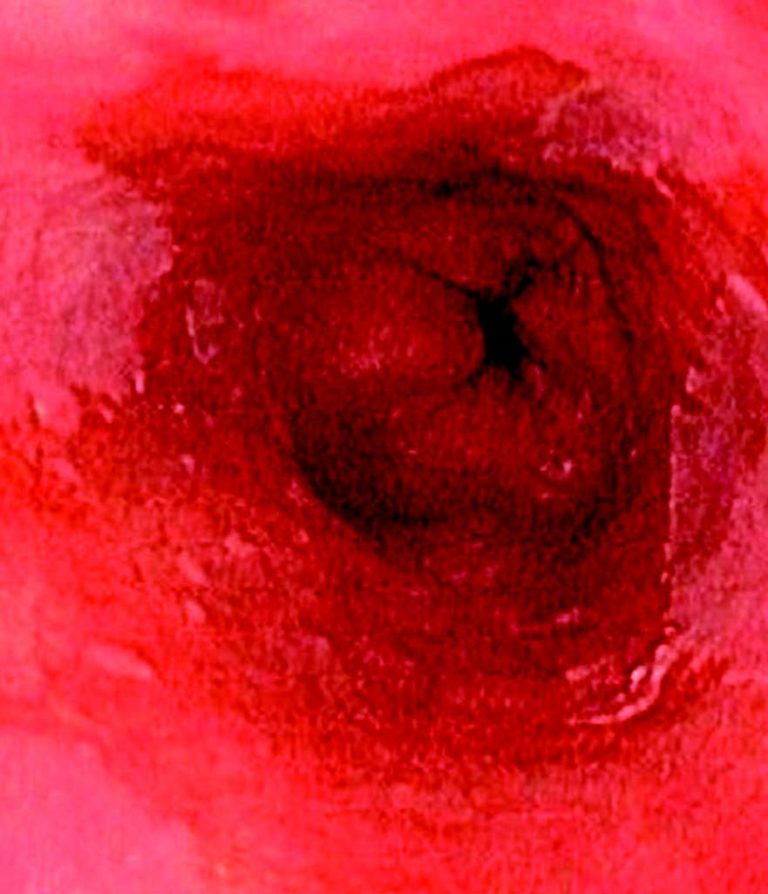
Endoscopic appearance of Barrett’s esophagus
“Reflux disease is not necessarily a benign condition,” warns thoracic surgeon David D. Shersher, MD, Co-Director of the Cooper Aerodigestive Program, MD Anderson Cancer Center at Cooper and Cooper Digestive Health Institute. “For high-risk patients with medically refractory GERD, it’s important that we offer treatment options beyond antacids to prevent their condition from progressing to esophageal malignancies.”
“In the past, squamous cell carcinoma was the predominant form of esophageal cancer,” he says, noting that, around the world, it still is. This type of esophageal malignancy is associated with smoking and alcohol use.
“But over the last decade or so in the United States, the majority of cases we’re seeing are adenocarcinomas in the distal portion of the esophagus, which are related to reflux disease,” he continues.
“Our job is not only to increase survival in patients who have esophageal cancer, but to prevent it from developing in the first place,” he adds. “And the latter requires that we address chronic GERD more aggressively.”
“GERD is quite common,” says gastroenterologist Joshua P. DeSipio, MD, Co-Director of the Cooper Aerodigestive Program, MD Anderson Cancer Center at Cooper and Cooper Digestive Health Institute, noting that about 20 percent of people have hallmark symptoms such as heartburn or nighttime regurgitation at least weekly. “For some, their condition is effectively treated with a short-term course of H2 blockers or proton pump inhibitors (PPIs).”
“Other cases are more complicated,” he continues. “They respond to medical treatment, but when it ends, their symptoms return. These patients tend to require lifelong medication.”
“Then there are those whose symptoms, even with long-term treatment, aren’t fully resolved,” he says. “Or they have atypical symptoms such as a chronic cough or throat clearing.”
“For those patients who have had reflux for more than five or 10 years, particularly if they’re over 50, we recommend a n endoscopy to screen for Barrett’s esophagus,” Dr. DeSipio notes, referring to the GERD complication that can sometimes be a precursor of esophageal cancer.
Other tests may include the Bravo esophageal pH test to measure and record the amount of acid flowing into the esophagus. A small capsule is temporarily attached to the esophagus wall during an upper endoscopy; it measures pH levels and transmits readings over 48 hours to a receiver worn on the patient’s belt or waistband.
There is also a 24-hour pH impedance test in which a tube is passed through the nose into the esophagus at the level of the lower esophageal sphincter (LES); it measures the movement of liquid from the stomach into the esophagus.
Lastly, esophageal manometry may be used to evaluate the function of the LES and esophageal muscles.
When GERD is confirmed as the culprit and it does not respond to medical management, Cooper offers several surgical interventions.
“We employ robotic surgery for hernia reductions and fundoplications,” Dr. Shersher says. The latter is a procedure to reinforce the LES in which the surgeon wraps the top of the stomach around the lower esophagus.
The newest technology for treating intractable GERD is the LINX® Reflux Management System. It consists of a small band of magnetized titanium beads wrapped around the LES; this helps prevent gastric acids from refluxing from the stomach into the esophagus while also safely allowing the LES to open for swallowing.
“Patients are able to go home the next day, and the long-term outcomes are excellent,” says Dr. Shersher.
Another notable capability at Cooper is its multidisciplinary approach to treating patients who suffer from both GERD and obesity.
“Obese patients tend to have more reflux,” Dr. DeSipio says. “In patients with severe GERD, hiatal hernia, and obesity, we can do combination procedures in collaboration with bariatric surgeons to help resolve everything at once.”
“Patients with medically refractory GERD can be a difficult population to manage,” Dr. Shersher says. “We’re here to help primary care physicians screen these patients appropriately, and provide the necessary interventions, so they can maintain the best possible aerodigestive health.”
For a physician to physician consultation, or to discuss a patient case, call Dr. Joshua DeSipio at 609.238.4320 or Dr. David Shersher at 609.947.3658.
